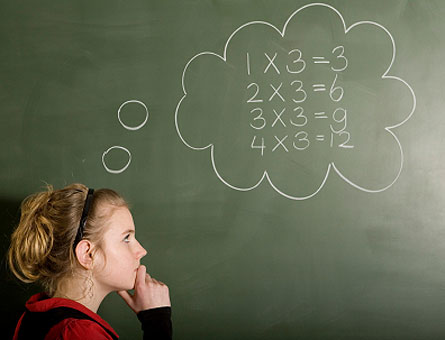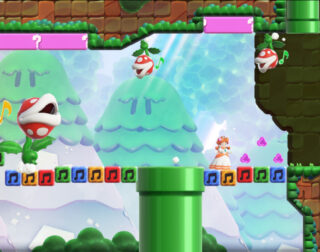Children who struggle with math often experience difficulties in recalling basic math facts. They may appear to learn a portion of the multiplications tables one day, only to seem to forget the whole thing by the next day. Two experts on working memory, Susan Gathercole and Tracy Alloway, describe how difficulties with both verbal working memory and visual spatial working memory had been associated with difficulties in learning math. Working memory may become overloaded in activities for developing basic numeracy skills, resulting in frequent errors of calculation. This has a direct impact upon a child’s capacity to learn more complex math skills as they need to expand a great deal of energy trying to recall simple facts.
Doing math in “your head” — or mental math — requires significant amounts of working memory. Children need to store the information that they have heard, be able to recall and retrieve those facts, and then process the information correctly apply it. Doing a math requires students to keep in mind all of the facts that they had just heard, engage in calculations, and then recall additional math facts in order to complete the problem. Poor performance in mental calculation is commonly a result of poor working memory, resulting in the loss of information. This may also contribute to some difficulties when a child needs to apply a particular formula or a mathematical rule to solve a problem.
Fortunately, there are a number of strategies that can help children who struggle with working memory and math. Some of these involve the use of digital technologies and apps, And all of them require a desire to learn and acquire information.
[cjphs_content_placeholder id=”73534″ random=”no” ]
5 Ways to Boost Working Memory and Improve Math Skills
1.) Support Working Memory. If poor Working Memory skills lead to holes in information and a misunderstanding of class lessons, learn to use classroom strategies that help support Working Memory. If your child struggles to organize notes and write down key facts in time, consider using a tool like Livescribe, which records audio while it writes. This allows students to capture class lectures and link that audio to areas of their notes. Something as simple as having a calculator handy can help kids complete calculations faster and keep up with class lessons.
2.) Play games to improve spatial skills. The data is quite compelling that visual spatial working memory is strongly related to mathematical performance. Therefore using games such as Super Hexagon, Portal 2 and Pivvot that can exercise spatial skills may provide support for some week mathematical skills. This is likely to be particularly be helpful in mathematical areas such as geometry, trigonometry, and calculus.
3.) Train your brain. Train your working memory with a formal program such as Cogmed Working Memory Training or Jungle Memory. Research on Cogmed indicates it can be very helpful in improving math skills such as the ability to recall math facts and equations, making it easier to hold information such as multiplication tables in mind. Other formal working memory programs have also demonstrated capacity to transfer memory skills from the training program to mathematical skills.
4.) Over learn. Over learn mathematical concepts and formulas. A child who understands math thoroughly through repetition becomes less likely to rely upon working memory skills when it comes to doing calculations in problem solving. We strongly suggest using Khan Academy to help in this regard, as lessons are short, very clear, and can be repeated a number of times to promote over learning.
5.) Use a multimodal approach. If allowed to, have your child take pictures of lessons in the classroom, verbally record a problem that one needs to solve after reading it and see if that helps. Sometimes drawing and creating a visual representation of a math problem can be helpful to supplement verbal working memory and visual spatial memory.






Hello, I am a mathematic professor, and I am interested by learning all about working memory and here relation with teaching and studying mathematics. do you have some reserchs’ results about developemnt of capacity of working memory?
We’re actually working right now on a devoted section of our site for educators and other professionals who work with children. As of now, try searching our blog, as we write a lot about current research regarding individual executive functions.